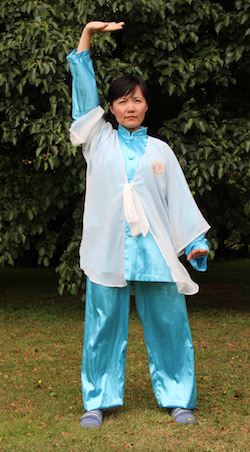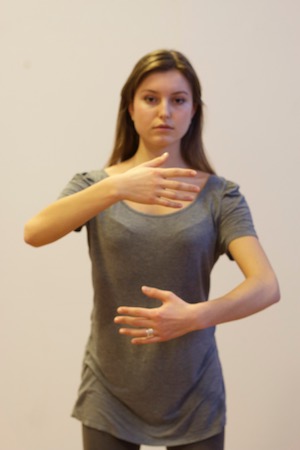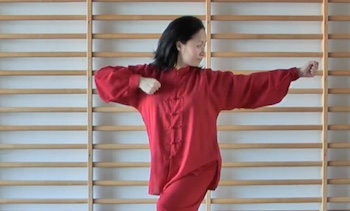Overview Qigong Studies: Some studies concerning Qigong and healing

As pointed out above, until now there is NOT any conclusive evidence whatsoever, that Qigong – irrespective of the sets and methods trained – has any tendency to heal certain diseases or illnesses. It is also NOT scientifically proven that any health effects of Qigong are in some kind deeper, more powerful or in some other way more effective than any other movement related activity as e.g. conventional health gymnastics or other Western or Eastern sports – modern or traditional.
Therefore the research list provided below is an overview of what has already been tried (which research settings and which viewpoints were scientifically explored until now). It does NOT provide an overview of diseases that can possibly be cured “using” Qigong. It does also NOT provide guidance concerning the question for which diseases or types of care Qigong is or should be typically used.
Though worded differently and with different levels of sympathy towards Qigong as a method shining through the wording, all studies suggest that there is no conclusive evidence for any healing effect on the diseases in question. The second point is often that more research would be needed to establish if there is at all any effect, and if so, if this effect differs in quality from the effects of other comparable methods.
On the one hand this is bad news for all who seek healing or want to sell healing powers, but on the other hand it gives the Qigong practitioner the freedom to just do the exercises one loves without being distracted by any other motives and constraints. In the end, it may be that the good feeling and the personal experience are the only things one can get from Qigong practice. Qigong may just be (or become) what you love to do – an “ordinary” hobby, which is an important part of your life. If practicing and consciously moving is what makes you happy, this could be Qigong’s way to preserve or improve your health.
Overview Qigong Studies
- Qigong and Chronic Obstructive Pulmonary Disease (COPD)
- Qigong and essential hypertension
- Qigong and primary prevention of cardio-vascular disease (CVD)
- Qigong and type 2 Diabetes
- Qigong and fibromyalgia syndrome (FMS)
- Qigong and symptoms of depression
- Qigong and Cancer
- Qigong and Depression
- Qigong and Parkinsons’s Disease
- Qigong and Neck and back pain
- Studies concerning Qigong and healthy adults: stress / anxiety, sleep
- Qigong and Sleep of the elderly
- Well done or just well meant? Different examples of research summaries on Qigong and healing
- Scientific positivism: Creating a virtual field of health benefits surrounding Qigong and Tai Chi
- The scientific value pyramid: presenting meta-analysis as a superior research method
- Well done – A critical, well-informed informed all-round view on Qigong as a therapeutic option
Qigong and Chronic Obstructive Pulmonary Disease (COPD)
Type: review/meta-analysis
Origin: Affiliated Hospital of Shandong University of Traditional Chinese Medicine, Jinan, China
Result: Qigong is showing better results than no practice, results being comparable to exercise training.
Conclusion: low methodological quality of trials, field not sufficiently studied to draw a firm conclusion.
Source: Ding Meng, Zhang Wei, Li Kejian, and Chen Xianhai. Effectiveness of T’ai Chi and Qigong on Chronic Obstructive Pulmonary Disease: A Systematic Review and Meta-Analysis, The Journal of Alternative and Complementary Medicine. February 2014, 20(2): 79-86. https://doi.org/10.1089/acm.2013.0087 (abstract only, full text in pay per view section)
Qigong and essential hypertension
Type: meta-analysis
Origin: Guangzhou University of Traditional Chinese Medicine, Guangzhou, People’s Republic of China / Kyoto University Hospital, Kyoto, Japan.
Result: Self-practized Qigong is better than no practice, but not better than development in active control groups.
Conclusion: More studies are needed to prove clinical benefits and to explore the mechanism.
Source: Guo Xinfeng, Zhou Bin, Nishimura Tsutomu, Teramukai Satoshi, and Fukushima Masanori, Clinical Effect of Qigong Practice on Essential Hypertension: A Meta-Analysis of Randomized Controlled Trials, The Journal of Alternative and Complementary Medicine. January 2008, 14(1): 27-37. doi.org/10.1089/acm.2007.7213 (abstract only, full text in pay per view section)
Qigong and primary prevention of cardio-vascular disease (CVD)
type: Meta-study
Origin: Medical School, Warwick university (UK) in cooperation with South Korea/China, Exeter University (UK)
Findings: Limited evidence.
Conclusion: more trials needed to establish effectiveness of Qigong for prevention.
Source: Hartley L, Lee MS, Kwong JSW, Flowers N, Todkill D, Ernst E, Rees K. Qigong for the primary prevention of cardiovascular disease. Cochrane Database of Systematic Reviews 2015, Issue 6. Art. No.: CD010390, doi.org/10.1002/14651858.CD010390.pub2 (abstract, plain language summary, full text)
Qigong and type 2 Diabetes
Type: Review/ Meta-analysis
Origin: Taiwan Nurses Association
Result: Qigong may have positive effect on HbA1c and fasting blood glucose. No significant effect on insulin sensitivity/insulin resistance.
Conclusion: Further studies required.
Source: Ju-Ping Huang / Mei-Ling Yeh. The Qigong Effect on Blood Glucose Control in People With Type 2 Diabetes: A Systematic Review and Meta-Analysis, Journal of Nursing & Healthcare Research. Sep2013, Vol. 9 Issue 3, p199-209. 11p. (not accessible online).
Qigong and fibromyalgia syndrome (FMS)

1) Efficacy and safety
Type: review / meta-analysis
Origin: Universities and (University) Hospitals; Duisburg-Essen, Homburg/Saar, Saarbrücken, Munich, Bochum, Germany
Scope: Qigong, Tai Chi and Yoga in fibromyalgia syndrome (FMS) care
Result: No serious adverse events were reported. Meditative Movement therapies are safe.
Conclusion: There is a need for high-quality studies with larger sample sizes to confirm the results.
Source: Langhorst J, Klose P, Dobos GJ, Bernardy K, Häuser W., Efficacy and safety of meditative movement therapies in fibromyalgia syndrome: a systematic review and meta-analysis of randomized controlled trials, Rheumatol Int. 2013 Jan; 33(1):193-207. Epub 2012 Feb 15.
doi: doi.org/10.1007/s00296-012-2360-1. (abstract only, full text in pay section)
2) Positive effects of Qigong
Type: review / meta-analysis
Origin: Universities and (University) Hospitals; Duisburg-Essen, Saarbrücken, Munich, Germany
Findings: Systematic review reveals low quality evidence for short-term improvement of pain, quality of life, and sleep quality and very low quality evidence for improvement of fatigue. No evidence was found for superiority of Qigong compared to active treatments. Though no serious adverse events were reported, there is no high quality evidence available on its positive effects.
Conclusion: The outlook states that Qigong may be a useful approach for FMS patients. At this point, only a weak recommendation for Qigong can be made. Further high quality research is required.
Source: A Systematic Review and Meta-Analysis of Qigong for the Fibromyalgia Syndrome
Lauche, R. / Cramer, H / Häuser, W / Dobos, G / Langhorst,J – A Systematic Review and Meta-Analysis of Qigong for the Fibromyalgia Syndrome, Evidence-Based Complementary and Alternative Medicine Volume 2013, Article ID 635182, 12 pages http://dx.doi.org/10.1155/2013/635182 (full text accessible)
3) Qigong, other movement therapies and fibromyalgia
Type: meta-analysis
Origin: School of Nursing, Oregon Health and Science University, USA
Research interest: Complementary and alternative medicine (CAM)-based movement therapies, including Tai Chi, Qigong, Yoga and a variety of lesser-known movement therapies. (Final analysis includes Tai Chi, Pilates, Resseguier method, Biodanza).
Result: Weak level of research, which suggests medium-to-high effect sizer in pain reduction. Lack of adverse events leads to the conclusion that there is little risk in recommending these practices as part of a multimodal treatment plan.
Conclusion: The analysis states a “need for large rigorous trials with active parallel arms”. – It is proposed to compare e.g. traditional aerobic exercise with CAM-based exercise to generate further evidence.
Source: Mist, Scott Davis / Firestone / Jones, Complementary and alternative exercise for fibromyalgia: a meta-analysis, Journal of pain research 2013:6 247-260,
http://dx.doi.org//10.2147/JPR.S32297 (abstract and full text)

Qigong and symptoms of depression
type: Review / meta-analysis
origin: Universities in China and Australia
Field of study: Medicine, sports, population health
Scope: Qigong and Tai Chi
Results: No main change in symptom scores were seen for Tai Chi, usual care, other exercises, education and the ‘miscellaneous’ group in pre-post assessment. Qigong appears to be beneficial for reducing depressive symptom severity.
Conclusion: Given the low quality of the included studies and the documented evidence of publication bias, these results should be viewed cautiously.
Source: Xin Liua, Justin Clark, Dan Siskind, Gail M. Williamse, Gerard Byrnec, Jiao L. Yangh, Suhail A. Doii, A systematic review and meta-analysis of the effects of Qigong and Tai Chi for depressive symptoms, http://dx.doi.org/10.1016/j.ctim.2015.05.001 (abstract, full version in pay section)
Qigong and Cancer
Note: There are no studies on the effectiveness of Qigong concerning the treatment of cancer as only therapy, as e.g. studies on the influence of Qigong on tumor growth and the like. Clinical trial studies related to Qigong and cancer are in fact cancer care studies. The participants are thus either pre- or post-operative; some studies relate to Qigong as movement therapy taking place during or after chemotherapy. Main research interest of studies on Qigong and cancer is thus not cancer healing in a narrow sense, but improving the quality of life (QOL) of cancer patients.
Medical Qigong and quality of Life – A must-read example for a (typical) trial study
Type: randomized controlled trial
Origin: University of Sydney, Australia and others
Conclusion: MQ can improve cancer patients’ overall quality of life and mood status, Specific side-effects of treatment can be reduced. It may also produce physical benefits in the long term through reduced inflammation.
Note: The conclusion in trial studies is designed to indicate the scope and findings of the trial in a nutshell. Conclusions of trial studies seem often more positive than the findings of meta-analyses because of the actual data which is directly produced in the process of the study. This study is a good read for all who want to get a glimpse into the “hard work in the shadows”. One can get an idea of how the data is produced and which practical obstacles are identified by the scientists on the way. One can witness which methodological questions are raised already at this level and the (self-)critique and awareness of the researchers. – And one can get an idea of how the effects of these insecurities may add up if a meta-analysis which is rested upon many of these single studies is too uncritical in its approach.
This trial study is selected and recommended for reading, because it is written in an understandable way and can be accessed for free online. There are many other trial studies which meet these criteria. – Our hope is that interested readers may click the link to the actual study next time, when new findings on Qigong and cancer are – sometimes boldly – presented. The actual science is in the details, not in the one sentence conclusion.
Source: B. Oh, P. Butow, B. Mullan, S. Clarke, P. Beale, N. Pavlakis, E. Kothe, L. Lam, D. Rosenthal Impact of Medical Qigong on quality of life, fatigue, mood and inflammation in cancer patients:
a randomized controlled trial, Annals of Oncology 21: 608–614, 2010 doi: doi.org/10.1093/annonc/mdp479 (full text)
2) Qigong and quality of life – An example of uncritical meta-analysis

type: Review / meta-analysis
Origin: Dalian Medical University, China (funded by the state of China as part of different national basic research and individual talent programs).
Scope: trials conducted in China, “standard technique“
Area of interest: depression, anxiety, pain, fatigue and “lower quality of life“ of cancer patients – and how TCM behavior interventions, in this case acupuncture, Chinese massage, TCM five elements musical intervention, TCM dietary supplement, Qigong and Tai Chi can help.
Results: All methods reduced functional impairments and led to pain relief, depression remission and reduced time to flatulence after surgery. They were even more beneficial in reducing fatigue and gastrointestinal distress. Acupuncture relieved fatigue, reduced diarrhea and decreased time to flatulence after surgery. The last point being also an asset of therapeutic Chinese Massage, while the latter also reduces time to peristaltic sound.
Conclusion: It is demonstrated that TCM behavioral interventions improve the quality of life of cancer patients and establish that these are “beneficial adjunctive therapies”.
This analysis is worth to take a look at, because it can be seen as an impressive example of working with many studies, numbers and diagrams, including a total of 72 annotations with limited reference to research technique and research interest, let alone critical assessment of the data. It thus has to be suspected that science is here used as a means to establish a truth which has already been known beforehand.
Source: Weiwei Tao / Xi Luo / Bai Cui et alii, Practice of traditional Chinese medicine for psycho-behavioral intervention improves quality of life in cancer patients: A systematic review and meta-analysis; oncotarget, Vol. 6 (2015), No. 37, 39725-39739, https://doi.org/10.18632/oncotarget.5388 (abstract and full text)
3) Quality of Life – Example of a more carefully worded meta-analysis
Type: meta-analysis
Origin: Dalian Medical University, School of Nursing (plus hospital) Beijing
This meta-analysis has been written by the same main author and with the same scope as the article above. Apparently, it is the same study, but more carefully worded concerning the results. – The (revised?) conclusion now reads: “Taken together, although there are some clear limitations regarding the body of research reviewed in this study, a tentative conclusion can be reached that acupuncture, Tuina, Tai Chi, Qigong, or TCM-FEMT represent beneficial adjunctive therapies. Future study reporting in this field should be improved regarding both method and content of interventions and research methods.”
Held against the article above, we can get a glimpse into how “real science” can evolve out of something close to advertising. The same study, now worded in the standard jargon of science, immediately seems representable to the inquiring mind of the critical reader. But: there is no evidence that the initial structure below this new scientific surface did change at all. It is a rare occasion one gets to compare these two versions, as there is little chance that one will always be able to take such a look inside the production of knowledge.
Source: Tao WW, Jiang H, Tao XM, Jiang P, Sha LY, Sun XC, Effects of Acupuncture, Tuina, Tai Chi, Qigong, and Traditional Chinese Medicine Five-Element Music Therapy on Symptom Management and Quality of Life for Cancer Patients: A Meta-Analysis.;Source: J Pain Symptom Manage. 2016 Apr;51(4):728-47; DOI: doi.org/10.1016/j.jpainsymman.2015.11.027 (full text)
Qigong and Depression
Possible developments of Qigong research – recommended reading!
Type: review / meta-analysis
Origin: Universites and Hospitals in China and the US (Guang’an Men Hospital, Beijing / University of North Carolina / Sichuan University, Chengdu / Massachusetts General Hospital, Boston ) – Study state-funded by the US and China
Field of study: Psychology / Social work
Conclusion: While not being able to reach a positive conclusion due to poor quality of the data available for analysis, the article thoroughly discusses the weaknesses of available study methods and offers valuable contributions for the development of further studies. Reading can strongly be recommended to all who want to get a glimpse into the exciting world of Qigong research and its future possibilities.
Source: Fang Wang, Jenny K. M. Man, Eun-Kyoung Othelia Lee, Taixiang Wu, Herbert Benson, Gregory L. Fricchione, Weidong Wang, Albert Yeung, The Effects of Qigong on Anxiety, Depression, and Psychological Well-Being: A Systematic Review and Meta-Analysis, Evidence-Based Complementary and Alternative Medicine Volume 2013, Article ID 152738, 16 pages, http://dx.doi.org/10.1155/2013/152738 (full text)
2) Possible dependence of types of depression
Type: review / meta-analysis
Origin: Hongkong University, Hongkong Polytechnical University
Field of study: Behavioral health / social work / rehabilitation
Result: The review states the limited number of studies and stresses the need for further research. It says that Qigong may be potentially beneficial for the management of depressive symptoms, but there are limits to the scope of this guess.
As most of the available studies were conducted among patients with secondary depression, minor depression, or elevated depressive symptoms, the results of the review may not be applicable to patients with primary depression. For similar reasons, the results may also not be applicable to patients with depression secondary to adverse life events. Most studies were conducted among patients with chronic illnesses and there are only very few studies concerned with young people with health problems.
Conclusion: “Moreover, it seems that Qigong is ineffective in relieving depressive symptoms for patients with severe physical problems such as cancer and Parkinson’s disease.” – Therefore the study cannot make any recommendation concerning the use of Qigong for patients with depression.
Source: Chong-Wen Wang, Cecilia Lai Wan Chan, Rainbow T. H. Ho, Hector W. H. Tsang, Celia Hoi Yan Chan, Siu-Man Ng , The Effect of Qigong on Depressive and Anxiety Symptoms: A Systematic Review and Meta-Analysis of Randomized Controlled Trials , Evidence-Based Complementary and Alternative Medicine Volume 2013, Article ID 716094, 13 pages http://dx.doi.org/10.1155/2013/716094 (full text)
Qigong and Parkinsons’s Disease
1) Qigong as a complement to medication
Type: review / meta-analysis
Origin: Contributors form different medical University hospitals, China
Field of study: Neurology
Research interest: meta-analysis of different studies concerning Tai Chi and Qigong as a complement to pharmacological treatment of PD.
Results: Concerning mild to moderately severe PD and compared to other therapy plus medication, Tai Chi plus medication showed better results in motor function and functional reach, but not in quality of life.
Conclusion: For Qigong there was not sufficient evidence to draw any conclusions at all. Though Tai Chi “should be recommended for PD management”, more studies are needed to “confirm the current findings”. (One can see the clearly positive attitude of the researchers toward the subject of their – ideally – neutral scientific endeavor even in their conclusions for further research.)
Source: Yang Y, Qiu WQ, Hao YL, Lv ZY, Jiao SJ, Teng JF, The efficacy of traditional Chinese Medical Exercise for Parkinson’s disease: a systematic review and meta-analysis., PLoS One. 2015 Apr 1;10(4):e0122469. doi.org/10.1371/journal.pone.0122469. (e-published full text).
2) Unusual correlations – due to (in)comparability of trial studies?
Type: review / meta-analysis
Origin: China/USA
Field of research: sports and health/kinesiology
Result: Meta-analysis of trials on the effect of Tai Chi and Qigong on depression and anxiety leading to the identification of 35 trials which were included in the final analysis. Higher-quality trials are needed with patients having elevated symptoms. Tai Chi and Qigong exposure has to be standardized in order to monitor effectiveness.
Conclusion: Up to now – Small to moderate effects on depression and anxiety.
Note: Other hints provided by the study include: Smaller effects when participants were allocated blindedly; “reductions were larger when people were Asian”; reductions were smaller when people were older; reductions were bigger with longer duration of sessions and higher weekly frequency. – All in all, this points towards a heterogenous field of trial studies. The question must be raised, if the studies are at all comparable. – At least if one is not prepared to accept without further testing that “Asian” people form a scientifically significant special group with heightened efficacy concerning the “healing powers” of Qigong. This would conflict with a modern understanding of Qigong and Tai Chi as practices which build upon the movement and cognitive abilities of any human body and mind.
Source: Jianchun Yin, Rodney K. Dishman, The effect of Tai Chi and Qigong practice on depression and anxiety symptoms: A systematic review and meta-regression analysis of randomized controlled trials, Mental Health and Physical Activity Volume 7, Issue 3, September 2014, Pages 135–146, http://dx.doi.org/10.1016/j.mhpa.2014.08.001 (abstract, full text in pay section)
Qigong and Neck and back pain
Safety of TCM methods
Type: review / meta-analysis
Origin: different Medical school hospitals, China
Field of study: orthopedics
Research interest: meta-analysis concerning the effect of several methods of Traditional Chinese Medicine on chronic neck and lower back pain.
Conclusion: No serious adverse effects were found – the methods are relatively safe. Concerning Tai Chi and Qigong no definite conclusions could be reached – further research is needed.
Qi-ling Yuan, Tuan-mao Guo, Liang Liu, Fu Sun, Yin-gang Zhang, Traditional Chinese Medicine for Neck Pain and Low Back Pain: A Systematic Review and Meta- Analysis., PLoS ONE 2015 10(2): e0117146. https://doi.org/10.1371/journal.pone.0117146 (abstract and full text)
Studies concerning Qigong and healthy adults: stress / anxiety, sleep
Qigong and Stress / Anxiety
Type: review / meta-study
origin: University of Hongkong
field of science: Behavioral health / social work and administration
Result: The body of evidence of 7 studies suggests Qigong exercise reduces stress and anxiety in healthy adults. But: While 4 studies hint at relieved anxiety in healthy adults, 2 Studies suggested immediate relieve of anxiety compared to (1) lecture attendance and (2) structured movement and 3 studies saw evidence for reduced stress compared to wait-list controls. One can question if the comparison groups of the included studies – which already meet some basic standards compared to the other studies not included – are designed sufficiently well enough to support meaningful evidence as to the efficacy of Qigong compared with other possible health related or therapeutic activity. The Qigong courses in the trial studies went on only between 1 and 3 months.
Conclusion: Given the limited number of trial studies and the questionable methodology, more and better designed studies are needed.
Source: Wang et al., Managing stress and anxiety through qigong exercise in healthy adults: a systematic review and meta-analysis of randomized controlled trials, BMC Complementary and Alternative Medicine 2014, 14:8, http://www.biomedcentral.com/1472-6882/14/8 (abstract, free download of full text pdf)
Qigong and Sleep of the elderly
Type: review / meta-analysis
Origin: Schools of Nursing, Fujian Medical university and Hong Kong Polytechnical university, China
Scope: Meta-analysis of Meditative Movement Interventions – i.e. a mix of methods including Tai Chi, Qigong, Yoga and mixed approaches („multicomponent MMI“). Duration of MMI was 12-24 weeks.
Result: The remaining studies hint at a moderate effect on improving the quality of sleep. Further hints: effect on sleep quality not influenced by duration of intervention (in the trial range of between 12 to 24 weeks); no positive effects on sleep quality in trials with intervention frequency of fewer than 3 times a week.
Conclusion: Evidence inconclusive, need for higher-quality trial studies, need to take into account different sub-groups of the elderly.
Wu Wei-wei, Kwong Enid, Lan Xiu-yan, and Jiang Xiao-ying., The Effect of a Meditative Movement Intervention on Quality of Sleep in the Elderly: A Systematic Review and Meta-Analysis., The Journal of Alternative and Complementary Medicine. September 2015, 21(9): 509-519. https://doi.org/10.1089/acm.2014.0251 (abstract, full text in pay section)
Well done or just well meant? Different examples of research summaries on Qigong and healing

Qigong research is a developing scientific field. All efforts to bring light into this “chaos” should be appreciated. There are some practitioners that take the time to read studies and make the essence of their reading efforts, their findings on Qigong and healing, accessible to other people. Presenting knowledge in a nutshell has its own risks, but the result may be worth the effort.
Due to the amount of reading done by the author(s), which is always the first step on the way of writing a research summary, these articles are sometimes misleadingly called studies themselves. This is problematic, as reading is not studying. To study means to show an inquiring mind, an open mind. The inquiry cannot simply be to inquire if what I thought in the beginning (and maybe all the way in my Qigong career) has now finally proven to be true. Searching for facts that strengthen my viewpoint is not research and summarizing these facts is not researching either.
Doing justice to these efforts is sometimes a bit tricky. On the one hand, from the scientific point of view, holding a viewpoint that is not clearly expressed in the set-up of the study and the influence of which is not discussed in the article/paper in question means having a bias. Proceeding with this bias means the outcome (often called “evidence”) produced on the way has to be judged as poor in quality. – On the other hand, speaking from a specific position makes good stories and gets the reader interested. We all know how important story-telling is in today’s marketing, but this kind of “science-style creative writing” is always at the expense of scientific credibility. Far from informing about the scientific findings themselves, some summaries use science as an incontestable mask for individual promotion or for the promotion of a preferred method (in this case Qigong or Tai Chi) by a professional organization.
The following shows some examples of articles, which claim to report or to analyze scientific research on Qigong, using scientific forms or scientific language. Three approaches towards and their views on Qigong and healing are explored: scientific positivism, the scientific value pyramid and a transdisciplinary all-round view.
Scientific positivism: Creating a virtual field of health benefits surrounding Qigong and Tai Chi
Example: “A Comprehensive Review of Health Benefits of Qigong and Tai Chi”, by Jahnke / Larkey / Rogers / Etnier / Lin
The review lists the viewpoints and angles, which have been explored by all kinds of Qigong research projects up to now. Consequently, this “comprehensive review” does not have any specific focus due to its rather broad approach. Without digging too deep into the actual evidence provided, these areas of research are henceforth presented as if they were typical fields for Qigong (and Tai Chi) health benefits to show up at some point. While the review cannot find any scientific ground to establish any difference to other exercise systems, it seems nevertheless to suggest that the mere existence of a considerable amount of research on Qigong/Tai Chi means that there is an alternative choice available for those not willing to do vigorous, conventional exercises.
The scientific problem here is, that the mere fact that research has been conducted in a specific field is confused with the evidence that Qigong actually does have a health benefit in this field. This evidence has not been established by now. The article draws upon studies and research hypotheses, but in the end, it just takes it for granted that Qigong has to be an alternative healing method, just because it has been researched upon as an alternative healing method. Boiled down all the way, Qigong is an alternative, because it has been used as an alternative (which might be the primary reason why it has been researched upon as an alternative). This is a classical example of circular logic, which scientific research tried to escape by putting Qigong to the test.
There is nothing wrong with treating Qigong as an alternative way of coping with illness. Doing Qigong because it feels good or just because it is said to have a long tradition as a health practice is perfectly fine. One can also choose to do Qigong just because one does not like traditional Western gymnastics, but that is not what scientific evidence on Qigong healing is about. —The review evades to answer the question what the state of scientific proof is. Thus, it does not really offer a critical assessment of evidence produced by scientific methods in natural sciences. In the end, it rather has to be seen as an example of the discursive technique of finding truth in repetition: A virtual field of health benefits surrounding Qigong and Tai Chi is spoken into existence. — For which reason? One does not know.
LINK: doi.org/10.4278/ajhp.081013-LIT-248 (e-published in: Am J Health Promot. 2010; 24(6): e1–e25).
The scientific value pyramid: presenting meta-analysis as a superior research method
Example: “Know the evidence”, National Qigong Association (US)
“Know the evidence” is a service of the National Qigong Association for its members.
The introduction of the paper basically portrays a hierarchy of scientific research. It states that on a basic level, there are trial studies and on a level above them there are meta-analyses. Therefore, the actual scientific work is effectively associated with a low level, while the automatized analysis of many of these studies is associated with a higher level of scientific knowledge. This approach would mean that any accumulation of meta-analyses (so to say a meta-meta-analysis) would be the highest state of the art, the “most scientific” or most knowledgeable viewpoint. Such a summary of meta-analysis – i.e. knowledge in its most concentrated form – is attempted to provide in the paper.
The idea that one could enhance the value of trial research by seeing several studies in a new context is in itself debatable (see here). Accepting the idea that purer knowledge can somehow be condensed out of trial evidence in this way is justifiable, but: using this method means one always has to bear in mind the sources of error enclosed in the trials themselves. Entitled “know the evidence”, one would at least expect the paper to read the meta-studies themselves carefully and critically, as the reader expects a distilled summary.
Without exception, the meta-studies themselves always assess the evidence produced in the trial studies. They regularly state that more evidence from these original studies (i.e. research of the „lowest hierarchy“) is needed to be able to reach a scientific conclusion. The meta-analyses themselves state that more high quality evidence is needed. Uncritically proceeding at this point to detect scientific evidence in these studies – which themselves decline to warrant positive health effects – seems at least illogical. It also means to willfully ignore the fragility of the base of one’s own argument. Turning a deaf ear to the expert warning that the concrete platform in question is barely good enough as a foundation for a single family home, the research overview proceeds to rest a skyscraper on it. This engineering approach only works when building castles in the air. – One cannot imagine that the movement arts Tai Chi and Qigong will benefit in the long run, if professional organizations provide such misleading information, even if the effort is well-meant.
Nevertheless, the list of studies provided in the paper could be a useful resource for readers who are prepared to follow the leads to the end and actually read the studies listed.
link: https://nqa.memberclicks.net/index.php?option=com_dailyplanetblog&view=entry&year=2017&month=10&day=04&id=15:know-the-evidence-may-2017-updated-review
Well done – A critical, well-informed informed all-round view on Qigong as a therapeutic option
A far more balanced overview can be found on the website of the Natural Medicine Journal, the official journal of the American association of naturopathic physicians. This “evidence-based review of Qi Gong by the Natural Standard Research Collaboration” combines background information on Qigong and its types of therapy with a critical discussion of the evidence. The review is aimed at integrative healthcare practitioners and thus provides a neutral and informative overview with an eye on the possible practical use of Qigong. Although the 11 pages of the review date back to 2010, reading is highly recommended, because of its exemplary approach. Sadly, the even longer full version is no longer available online.
Qigong Healing Series
Qigong and healing Qigong, working with the Qi (life energy), is commonly known as furthering overall health. – However, its underlying idea of Yangsheng – nurturing of life force or short: care for life – does not automatically distinguish it from other systems of caring for health, movement methods or other forms of (therapeutic) breathing techniques…
Qigong Scientific Studies Scientific studies about the efficiency of Qigong face a double challenge. For one thing, the cultural background of Qigong leads to a specific view of the human condition, which in part conflicts with the Western view on the human body, which lies at the foundation of “modern” medical research. An additional problem is that scientific standard methods of medical research, which determine today’s Qigong research, are to some extent unsuitable to capture typical aspects of Qigong, due to the Western image of medicine and its rootedness in a distinct research tradition.
Qigong studies – background and significance This part explains how Qigong studies refer to their subject Qigong (What is Qigong?). The most common kind of study is explained and its background and significance is explored…
Qigong and healing part 4 – Qigong research – meta-studies Apart from single test series (randomized controlled trials) Qigong research mainly consists of meta-studies and reviews. This text deals with their function and their typical findings. Contrary to what its name may indicate, meta-studies are not per se “better” studies than trial studies. The method behind meta-studies is to search data bases and …
Qigong and healing part 5 – The landscape of Qigong research The strictly practice-related approach of this kind of Wellness-Qigong research eclipses the theoretical problems; the contradictions mentioned above seem to be solved. – Regrettably, the opposite is true: The evidence produced in such a “practice-led” research cover the scientific dilemma, but do not contribute to its solution. Actually, with this research approach it does not matter at all, if one researches about Qigong or other methods (Yoga, Pilates, Zumba,…). The decision about the focus of the studies is neither related to a certain cognitive interest attached to the health method in question nor to the experimental design as such, but it is solely a question of taste or fashion…
Sources of medical research about Qigong and Healing The difficulty for all people interested in Qigong research is that with Qigong being a exercise system aimed at overall health the articles are scattered over different research areas. The question thus is: Where to start? Research conducted at university institutes is regularly published in respective scientific or professional journals, which differ in scope and importance from country to country…
Assessment of Publications on Qigong and Healing Some key points for the assessment of publications on Qigong and healing: What are possible clues for the assessment of a publication? Is a scientist a Qigong expert? Is a Qigong expert who really gets into the details of the art – i.e. „researches“ as part of his work – a scientist?
Qigong & Cancer Healing I have been a practitioner and teacher of Qigong (Yangsheng) for many years. In the scheme of things I am reasonably well qualified and have a great deal of experience. For the past few years I have been teaching Qigong professionally to cancer patients at a Maggie’s Cancer Care Centre. I can tell you categorically that I do not teach Qigong to cancer patients in order to cure their cancer. Claims of curing cancer with Qigong are not only bold but dangerous and irresponsible. They prey on the vulnerable and desperate. Even the more well known ‘cancer curing’ Qigong methods like the Gui Lin Walking Qigong has no real scientific basis for claim…
Qigong Influence on own Cancer I was initially diagnosed with prostate cancer with metastasis in the spine 4 years ago in early 2014. At this point, I was completely unaware of the existence of qigong. The following year was spent in and out of hospital. Progress of the cancer was duly halted thanks to medication and numerous radiotherapy sessions. However, some damage to the spine cannot be reversed by medical treatment. I truly believe that qigong has saved my life so far…
GAINING POST CHEMO STRENGTH THROUGH QI GONG On June 30th 2012 I was diagnosed with a squamous cell carcinoma on the oesophagus – considered at the time to be terminal. Now in my third year as a student in this class I can report that I could not have made a better decision…
Author: Taiji Forum
Images: Taiji Forum
